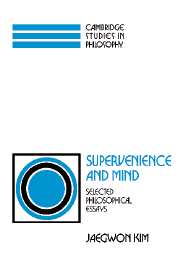Book contents
- Frontmatter
- Contents
- Preface
- Sources
- Part I Events and supervenience
- 1 Causation, nomic subsumption, and the concept of event
- 2 Noncausal connections
- 3 Events as property exemplifications
- 4 Concepts of supervenience
- 5 “Strong” and “global” supervenience revisited
- 6 Epiphenomenal and supervenient causation
- 7 Supervenience for multiple domains
- 8 Supervenience as a philosophical concept
- 9 Postscripts on supervenience
- Part II Mind and mental causation
- Index
9 - Postscripts on supervenience
Published online by Cambridge University Press: 28 January 2010
- Frontmatter
- Contents
- Preface
- Sources
- Part I Events and supervenience
- 1 Causation, nomic subsumption, and the concept of event
- 2 Noncausal connections
- 3 Events as property exemplifications
- 4 Concepts of supervenience
- 5 “Strong” and “global” supervenience revisited
- 6 Epiphenomenal and supervenient causation
- 7 Supervenience for multiple domains
- 8 Supervenience as a philosophical concept
- 9 Postscripts on supervenience
- Part II Mind and mental causation
- Index
Summary
RELATIONAL SUPERVENIENCE
Asked how badly he wanted to win the Super Bowl Washington Redskin left guard Russ Grimm replied, “I'd run over my mother to win it.” The quote was repeated to Los Angeles Raider inside linebacker Matt Millen, who answered, “I'd run over her, too, - I mean Grimm's mother.”
Sports Illustrated, January 30, 1984Accounts of supervenience to date have almost exclusively focused on properties (that is, monadic attributes), although relations are informally mentioned sometimes in connection with supervenience. What happens if relations are explicitly taken into consideration in characterizing supervenience?
Let A be the supervening set of attributes, and B the base set. Consider first the case in which A includes an n-adic relation R, but B includes only monadic properties. It is evident that for R to supervene on B, the following condition is necessary and sufficient:
For any n-tuples, (x1,..., xn) and (y1,..., yn) (to be abbreviated as Xn and Yn respectively), if they are indiscernible in set B, then R(Xn) iff R(Yn)
Depending on whether the n-tuples compared are restricted to a single world or may berecruited from different worlds, this will yield either “weak” or “strong” supervenience (Essay 5). But what is it for two n-tuples,Xn and Yn, to be indiscernible from eachother with respect to B? Since B is assumed to include only properties and norelations, the answer is simple: Xn is indiscernible fromYn in B just in case for each i (1' i' n) xiis indiscernible from yiin respect of B-properties.
- Type
- Chapter
- Information
- Supervenience and MindSelected Philosophical Essays, pp. 161 - 172Publisher: Cambridge University PressPrint publication year: 1993
- 22
- Cited by



